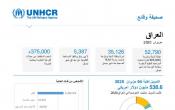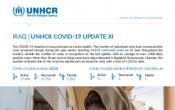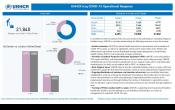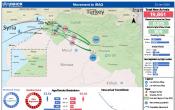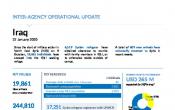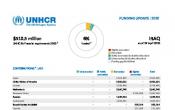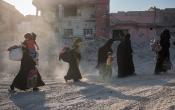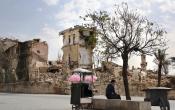Iraq
Operation: Iraq
Location
{"longitude":43,"latitude":33,"zoom_level":0,"iso_codes":"'IRQ'"}
By clicking on the icons on the map, additional information is displayed.
The boundaries and names shown and the designations used on this map do not imply official endorsement or acceptance by the United Nations.
Key Figures
| 2020 planning figures | |
| 143,240 | refugee and IDP households receive cash grants |
| 108,500 | people of concern gain legal assistance |
| 7,700 | people of concern benefit from civil status registration or documentation |
| 2018 year-end results | |
| 233,770 | people of concern received core relief items |
| 97,640 | IDP families received core relief and seasonal items |
| 81,560 | IDPs received legal assistance |
| 39,500 | Syrian refugee families received cash assistance |
| 28,150 | IDP families received multi-purpose cash grants |
| 15,210 | Syrian refugees received support for primary education |
| 7,110 | IDP families received emergency shelter and refugee housing units |
Latest Updates and Related Links
People of Concern
30%
Decrease in
2019
2019
| 2019 | 2,180,062 |
| 2018 | 3,092,425 |
| 2017 | 4,501,786 |

[["Refugees",273992],["Asylum-seekers",12938],["IDPs",1414632],["Returned IDPs",431130],["Returned refugees",101],["Stateless",47253],["Others of concern",16]]
Loading ...
Iraq
< Back
2019
{"categories":[2015,2016,2017,2018,2019,2020],"budget":[556.06492208,546.94595405,557.093760866,559.82611683,602.477448437,538.64381787],"expenditure":[266.34543259,338.02568545,252.37669675,213.92686105,203.02508774,null]}
{"categories":[2015,2016,2017,2018,2019,2020],"p1":[136.09662109,116.48767369,137.52939031,135.89173072,185.67386308,194.77846032],"p2":[2.0459884,0.80424081,0.623739,0.307821,0.46577979,0.93430746],"p3":[35.76378805,26.70785472,null,null,null,null],"p4":[382.15852454,402.94618483,418.940631556,423.62656511,416.337805567,342.93105009]}
{"categories":[2015,2016,2017,2018,2019,2020],"p1":[102.03521415,98.77158239,78.07126444,72.24820125,72.21031726,null],"p2":[1.499491,0.30823717,0.26725107,0.23696317,0.26995741,null],"p3":[11.32961956,1.89021959,null,null,null,null],"p4":[151.48110788,237.0556463,174.03818124,141.44169663,130.54481307,null]}
Loading ...
CHOOSE A YEAR
- 2014
- 2015
- 2016
- 2017
- 2018
- 2019
- 2020
Year-end Overview
Operational Environment
The Government of Iraq declared in December 2017 that it had regained control of all Iraqi territory from extremist groups. However, the needs of the affected population remain high. There are almost 1.9 million people currently internally displaced from the conflict, which began in 2014. According to the International Organization for Migration’s displacement tracking matrix, there are close to 4.1 million IDP returnees. Many families continue to face constrained access to basic services, and security and protection risks while contending with destroyed properties and critical infrastructure, and the lack of livelihood opportunities and financial resources. In some instances, this has led to secondary displacement. There is need for continued support to the displaced population and extensive reconstruction to allow for sustainable return.UNHCR leads the Protection, Camp Coordination and Camp Management (CCCM), and Shelter/Non-Food items clusters, as part of the cluster coordination mechanism for the IDP response, and co-leads the Working Group on Sustainable Solutions for IDPs within the Resilience and Recovery Programme (RRP) with UN Habitat. UNHCR will continue to engage governmental, humanitarian and development actors to transition IDP issues into development plans, and support a gradual absorption of needs-based assistance into the Iraqi social welfare system.
UNHCR collaborates with the Government of Iraq and Kurdistan Regional Government to assist refugees and asylum-seekers, and on statelessness prevention and response. Through the Regional Refugee and Resilience Plan (3RP), UNHCR leads the humanitarian response for Syrian refugees in coordination with authorities. UNHCR advocates with authorities to maintain open borders and ensure access to safety.
Key priorities
In 2019, UNHCR will focus on:- Providing core assistance, including in-kind and cash-based assistance to the most vulnerable individuals, maintaining efforts to explore all viable options to transition out of humanitarian interventions and pursue the systematic inclusion of people of concern into development plans;
- Mainstreaming sexual and gender-based violence (SGBV) response programmes into non-food item, shelter, and camp management activities, and increasing monitoring and access to quality response services across Iraq;
- Providing free legal services for those in displacement and in areas of return;
- Ensuring adequate shelter through prioritizing construction and repair of shelters for the most vulnerable IDP families;
- Advocating with the Government to develop a national legal framework for refugee protection and provide technical support to the authorities to enhance the protection environment for Syrian and non-Syrian refugees and asylum-seekers.


